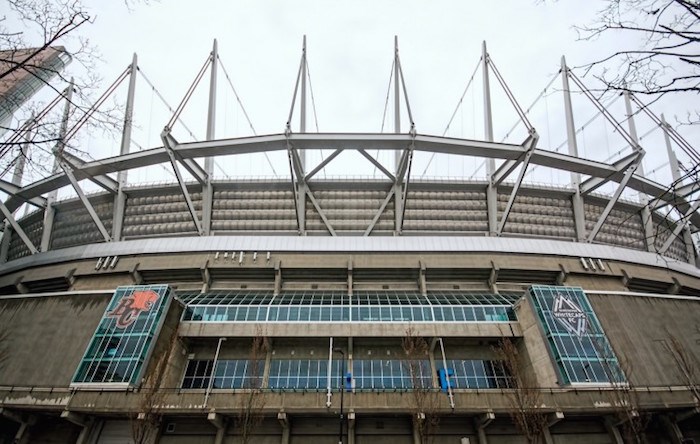The Crown corporation that operates BC Place Stadium and the Â鶹´«Ã½Ó³»Convention Centre is expecting to lose almost $60 million over the next four years.
The B.C. Pavilion Corp. (PavCo) service plan, released simultaneously with the NDP government’s provincial budget on Tuesday, forecasts $12.05 million in losses for the fiscal year to end March 31. More than 70 per cent of the total is attributed to BC Place Stadium.
Next year’s loss is estimated at $17.32 million.
BC Place forecasts hitting the 771,000 mark in annual attendance by the end of the current fiscal year, but that figure is projected to dip to 656,000 next year.
Delegate days at Â鶹´«Ã½Ó³»Convention Centre, based on confirmed and tentative bookings, are forecast at 372,000 for delegates outside Metro Â鶹´«Ã½Ó³»and 272,000 outside B.C. Those numbers are expected to rise substantially in 2023 and 2024 to 590,000 and 448,000, respectively, as the pandemic recovery accelerates.
Meanwhile, B.C. Lottery Corp. (BCLC) is forecasting a record $1.62 billion in net income in 2022-23, the first full fiscal year of normalized gambling operations in what BCLC calls a “post-pandemic environment.”
The Crown corporation’s pre-pandemic record was almost $1.42 billion in 2018-19. It is forecasting $1.58 billion next year.
BCLC’s service plan said it is banking on revenue boosts from the Gateway-operated new Cascades Casino in Delta, Lotto 6/49 enhancements and the Saskatchewan expansion of its PlayNow.com sports and betting site.
The new fiscal year is the target for the completed replacement of 3,500 lottery terminals and systems across the province, a $48 million project with $11 million left to complete.
“The capital costs of this project increased by $5 million compared to prior year, primarily due to lingering pandemic related global supply chain challenges,” said the BCLC report.
B.C.’s Liquor Distribution Branch (LDB) forecasts almost $1.18 billion in net income by March 31 and $1.15 billion next year.
“In fiscal year 2023-24 and future years, beverage alcohol sales dollar increases will be an average of 2.2 per cent primarily due to a small growth of volume in litres sold and higher costs,” the LDB report said.
Meanwhile, LDB assumes increases in marijuana sales will not have a significant impact on liquor sales. More private pot retailers will enter the marketplace, product selection will increase and direct delivery will increase access to products.
The Insurance Corp. of B.C. (ICBC) is forecasting a net loss of $298 million for the current fiscal year, a sharp switch from the $327 million in net income it had expected for the year.
“The forecasted net income for 2022-23 is $625 million lower than plan, which is mainly due to investment losses that are driven by global market volatility as inflation and interest rates increase,” said the ICBC report.
ICBC is expecting to break even in 2023-24, then be back in black at $450 million in 2024-25.
BC Hydro is budgeting $712 million in net income every year through 2025-26.
Total revenues are pegged at $8.014 billion this year, and $7.95 billion next year.
The electric company expects a decision in spring 2023 from its August 2021 rates application to the British Columbia Utilities Commission. The report cautions the regulator’s decision may change revenue and expense projections.
Seven capital projects worth a combined $451 million are targeted to be in service during 2023.
The G.M. Shrum control system upgrade and street light replacement program were budgeted at $75 million each. The latter involves converting 95,000 BC Hydro high-pressure sodium and mercury vapour street lights to LED.
BC Hydro’s biggest project, the Site C dam, remains targeted for 2025 service at a 2021-approved budget of $16 billion. As of Dec. 31, BC Hydro had spent $10.46 billion.



